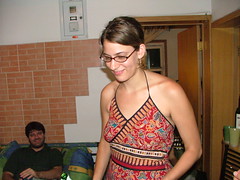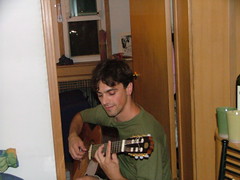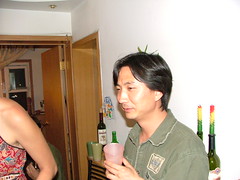This is my sister, Jane.
 Her Chinese name is Khang Zhen, which sounds kind of like Jane Cohen, and that's what many people now call her. Someone gave me a Chinese name of Khang and then a word for writer that starts with an s-sound. I think that's really cool and I wish I knew what it was, even though, as I pointed out crankily at the time, it's a little pointless to have a name in a language you don't speak.
Her Chinese name is Khang Zhen, which sounds kind of like Jane Cohen, and that's what many people now call her. Someone gave me a Chinese name of Khang and then a word for writer that starts with an s-sound. I think that's really cool and I wish I knew what it was, even though, as I pointed out crankily at the time, it's a little pointless to have a name in a language you don't speak. In the background is Deitrich, a German nuclear physicist whom Jane met under what I think are subtly hilarious circumstances. It was a cold, dark Beijing winter night, and Jane was trudging wearily through the campus of the university where she was studying (apparently the MIT of China). Suddenly, out of the darkness loomed a giant. The giant approached, and then asked her to have dinner with him. She said sorry, but she'd already had dinner, and then--and this is where everyone should take a page out of her book--said she'd be happy to have dinner with him some other time. He gave her his number, and she--another page--called it. He turns out to be a sweet and fun guy, who later took us, and a whole bunch of string players from the Tsinghua University orchestra, on a long crazy bike ride (during which almost everyone took a turn on his tandem) ending up at a festive roast duck dinner.
This is Brenton, Jane's boyfriend.
 His Chinese name is (I don't know how to spell it) Sue Tuen Tuen, and Jane almost always calls him Tuen-Tuen. The name apparently means something like "little rascal," and it also sounds funny when you say it. This is amusingly incongruous because he's sort of an upstanding, serious guy (he's also really fun and generally awesome).
His Chinese name is (I don't know how to spell it) Sue Tuen Tuen, and Jane almost always calls him Tuen-Tuen. The name apparently means something like "little rascal," and it also sounds funny when you say it. This is amusingly incongruous because he's sort of an upstanding, serious guy (he's also really fun and generally awesome).He is one of those ex-pats who is impatient with ex-pat scenes, and thinks hanging out with Chinese people is a much better use of time than clinging to any available Americans (although he's not doctrinaire about this in practice, happily). He's also one of those people who likes to do things the hard way; for instance, when I first met him he had just returned from a couple of days of being totally lost on a mountain because he was trying to find the back door of a Buddhist monastery rather than pay the tourist price at the front. (He literally thought he was going to die of being lost and out of supplies, but he was still able to text-message my sister through the whole ordeal. Cell phones in China have amazing reception. When he finally found a village, the people apparently looked at him like he was stupid and then told him that they had no water, they just drink out of the stream. So he did, and, as far as I know, is just fine.)
Anyway, true to form, he didn't want to find an apartment through the usual channels, so he just wandered around asking people if they knew of anywhere he could live, and that's how he came to live with his roommate, Dustin.
 I don't even know Dustin's Chinese name. Jane gave him the English name of Dustin because he looks like Dustin Hoffmann, and he has now adopted it as his own. He does look like him, doesn't he? Cross-race resemblances are my new favorite weird phenomenon.
I don't even know Dustin's Chinese name. Jane gave him the English name of Dustin because he looks like Dustin Hoffmann, and he has now adopted it as his own. He does look like him, doesn't he? Cross-race resemblances are my new favorite weird phenomenon.Dustin is in Beijing studying to pass the Chinese bar, which is apparently nearly impossible, but he grew up in the mountains of the Yunnan Province near the city of Kunming, where his family runs a resort. While we were in that area, my sister arranged for some of us to spend the afternoon at his family's place. It was an amazing experience, which I want to write about in itself when my sister sends me the pictures from that day: we walked around a village where people had never seen a westerner before, were invited into houses and served bucketfuls of peaches, and witnessed a bunch of teenagers performing their nightly courtship dance (accompanied by a Chinese-banjo strumming kid who looked exactly like one of my 39B students except for the huge peacock feather in his hat).
The whole experience--two enormous meals for six, tons of beer and baijo (a drink nicknamed "liquid lobotomy"), guided tours through the village, two hotel rooms where we kept our stuff and used the facilities for the afternoon, and two cars driving us a couple of hours each way--cost about $200. That seemed like a pretty good deal to all of us, but Jane thought it was weird that it was that much, and was privately worried that the family might have been taking advantage. When we got back to Beijing and asked Dustin about it, it turned out that the reason it was so expensive was that Jane had asked for "the best food." In response to that, they had slaughtered us a goat. They also served us some kind of endangered species, but we can't figure out which dish it was (maybe the frog soup?).
Dustin was also involved in one of the most fun experiences I had in Beijing. We went over to Tuen-Tuen's neighborhood for dinner one night, and, to our temporary chagrin, it turned out that Dustin and their third roommate (Jong Lien, or something like that) were going to join us at the restaurant. We were chagrinned because they don't really speak English, and my sister had been trying hard not to put me in situations where I couldn't understand what was going on.
After a lot of chwar (meat on a stick) and pijiu (beer), though, the conversation turned to poetry. Dustin and the other roommate started reciting classical Chinese poems, and then Tuen-Tuen translated them (with great skill and fluidity). I wish I could remember what the poems meant, but it doesn't really matter because they obviously lost a lot in translation. In the original, they were just incredibly gorgeous. It was by far the most moved I've ever been by listening to the sounds of poetry in a foreign language. Maybe it was because I had been steeped in the sounds of Chinese for a few weeks, and so was attuned to them even though I didn't understand them, but hearing those poems made English seem impoverished for not being a tonal language. There were such intricate patterns in the way the variety of tones played over the regularity of line length, and they were absolutely clear even to a foreigner's ear.
After that, I recited "Stopping by the Woods on a Snowy Evening" (the most "American" poem I could think of) and watched Tuen-Tuen struggle to translate lines like "He gives his harness bells a shake." Later, after I taught Jane "This Be the Verse" on the subway, we thought maybe I should have recited that one instead, but I think not. "My Papa's Waltz," anyone?
No comments:
Post a Comment